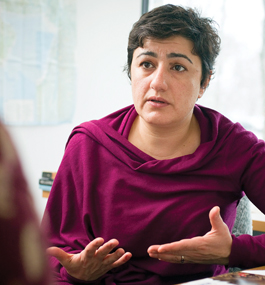Outside the Arab Spring

Photo by Tom Kates
Naghmeh Sohrabi is associate director for research at the Crown Center for Middle East Studies and a lecturer in history.
First and foremost, the current regime came into power through a grass-roots revolution in 1979, little more than a generation ago. As a result, not many Iranians have much of a stomach for earth-shattering revolutions that leave in their wake more questions than answers.
Second, many Iranians feel ownership of that revolution, whether or not they now support the government. That means the segment of the population that opposes President Ahmadinejad is not necessarily against the Islamic Republic as a whole. This reality is limiting widespread, bottom-up, antisystem protests of the kind Egypt has experienced.
Consider the different slogans chanted in Egypt in 2011 and in Iran in 2009 during the disputed presidential election. The most common slogan of the Egyptian protests was “The people want the fall of the system!” In Iran in 2009, the protesters’ refrain was “Where is my vote?” The former demanded an overhaul of the political system, while the latter asked the regime to keep its own promise of a free — if not fair — election.
Iran has remained relatively untouched by the Arab Spring, though the uprisings have slowed down the country’s attempts at regional hegemony. Regardless of interstate relations (Iran and Mubarak’s Egypt were not on the friendliest terms), Iran had kept an eye on the discontented citizens of its neighbors and provided the kind of anti-imperialist rhetoric that the Arab populations used to respond to.
With the events of early 2011, as the Arab world turned inward and began to grapple with questions of reform, support for the radicalizing rhetoric of the Iranian government waned. Moreover, Iran’s support for the Bashar regime in Syria until now (despite its tepid criticism of the violence of the state against its own population) has not helped the Iranian regime gain in popularity among its Arab neighbors.
